Potiphar is a figure in the Hebrew Bible and the Quran. His name possibly indicates the same figure as Potiphera.

Joseph is an important Hebrew figure in the Bible's Book of Genesis. He was the first of the two sons of Jacob and Rachel. He is the founder of the Israelite Tribe of Joseph. His story functions as an explanation for Israel's residence in Egypt. He is the favourite son of the patriarch Jacob, and his jealous brothers sell him into slavery in Egypt, where he eventually ends up incarcerated. After correctly interpreting the dreams of Pharaoh, however, he rises to second-in-command in Egypt and saves Egypt during a famine. Jacob's family travels to Egypt to escape the famine, and it is through him that they are given leave to settle in the Land of Goshen.
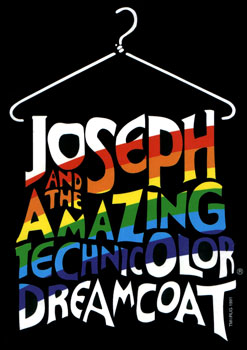
Joseph and the Amazing Technicolor Dreamcoat is a sung-through musical with lyrics by Tim Rice and music by Andrew Lloyd Webber, based on the character of Joseph from the Bible's Book of Genesis. This was the first Lloyd Webber and Rice musical to be performed publicly; their first collaboration, The Likes of Us, written in 1965, was not performed until 2005. Its family-friendly retelling of Joseph, familiar themes, and catchy music have resulted in numerous stagings. According to the owner of the copyright, the Really Useful Group, by 2008 more than 20,000 schools and amateur theatre groups had staged productions.

Yusuf is a prophet mentioned in the Quran and corresponds to Joseph, a person from the Hebrew and Christian Bible who was said to have lived in Egypt before the New Kingdom. Of Jacob's children, Joseph reportedly had the gift of prophecy. Although the narratives of other prophets are presented in a number of surahs, Joseph's complete narrative appears in only one: Yusuf. Said to be the most detailed narrative in the Quran, it contains more details than its biblical counterpart.
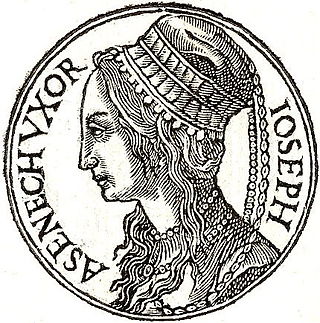
Asenath is a minor figure in the Book of Genesis. Asenath was a high-born, aristocratic Egyptian woman. She was the wife of Joseph and the mother of his sons, Manasseh and Ephraim.
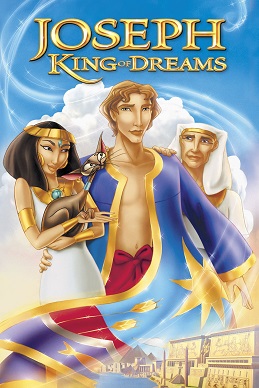
Joseph: King of Dreams is a 2000 American direct-to-video animated biblical musical drama film. It is the only direct-to-video production from DreamWorks Animation. The film is an adaptation of the story of Joseph from the Book of Genesis in the Bible and serves as a prequel to the 1998 film The Prince of Egypt. Composer Daniel Pelfrey stated that the film was designed as a companion piece to The Prince of Egypt, noting that though "Joseph turned out to be very different than The Prince of Egypt, it was very challenging and rewarding".

Vayeshev, Vayeishev, or Vayesheb is the ninth weekly Torah portion in the annual Jewish cycle of Torah reading. The parashah constitutes Genesis 37:1–40:23. The parashah tells the stories of how Jacob's other sons sold Joseph into captivity in Egypt, how Judah wronged his daughter-in-law Tamar who then tricked him into fulfilling his oath, and how Joseph served Potiphar and was imprisoned when falsely accused of assaulting Potiphar's wife.

Vayigash or Vaigash is the eleventh weekly Torah portion in the annual Jewish cycle of Torah reading. It constitutes Genesis 44:18–47:27. In the parashah, Judah pleads on behalf of his brother Benjamin, Joseph reveals himself to his brothers, Jacob comes down to Egypt, and Joseph's administration of Egypt saves lives but transforms all the Egyptians into bondmen.

Miketz or Mikeitz is the tenth weekly Torah portion in the annual Jewish cycle of Torah reading. It constitutes Genesis 41:1–44:17. The parashah tells of Joseph's interpretation of Pharaoh's dreams, Joseph's rise to power in Egypt, and Joseph's testing of his brothers.

Israel in Egypt, HWV 54, is a biblical oratorio by the composer George Frideric Handel. Most scholars believe the libretto was prepared by Charles Jennens, who also compiled the biblical texts for Handel's Messiah. It is composed entirely of selected passages from the Old Testament, mainly from Exodus and the Psalms.
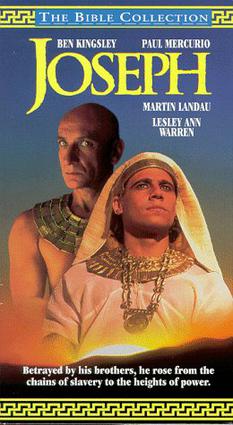
The Bible: Joseph is a 1995 German/Italian/American television miniseries about the life of Joseph from the Old Testament. It was filmed in Morocco and aired on TNT. At the 47th Primetime Emmy Awards, Joseph won one award from five nominations.

Potiphar's wife is a figure in the Hebrew Bible and the Quran. She was the wife of Potiphar, the captain of Pharaoh's guard in the time of Jacob and his twelve sons. According to the Book of Genesis, she falsely accused Joseph of attempted rape after he rejected her sexual advances, resulting in his imprisonment.

Joshua is an oratorio by George Frideric Handel. It was composed in a month, from 19 July 1747 to 19 August 1747, six months before the beginning of the oratorio season. Joshua is Handel's fourth oratorio based on a libretto by Thomas Morell. The oratorio premiered on 9 March 1748 at the Covent Garden Theatre, London. Joshua is based on the Biblical story of Joshua as the leader of the ancient Israelites. The story follows the Israelites from their passage over the Jordan River into Caanan and through the Battle of Jericho. The work also includes a love story elaborated from a few hints in the Biblical narrative between Caleb's daughter Achsah and Othniel, a young soldier.

Deborah is an oratorio by George Frideric Handel. It was one of Handel's early oratorios in English and was based on a libretto by Samuel Humphreys. It received its premiere performance at the King's Theatre in London on 17 March 1733.

An Occasional Oratorio is an oratorio by George Frideric Handel, based upon a libretto by Newburgh Hamilton after the poetry of John Milton and Edmund Spenser. The work was written in the midst of the Jacobite rising of 1745–1746, the attempt to overthrow Handel's patrons the Hanoverian monarchy under George II and replace them with a Stuart restoration under Charles Edward Stuart, "Bonnie Prince Charlie". The Occasional Oratorio is unique among Handel's works which he labelled "oratorio" in that it does not tell a story or contain elements of a drama, but was intended as a defiant and patriotic rallying piece.

Joseph is an opéra comique in three acts by the French composer Étienne Méhul. The libretto, by Alexandre Duval, is based on the Biblical story of Joseph and his brothers. The work was first performed by the Opéra-Comique in Paris on 17 February 1807 at the Théâtre Feydeau. It mixes musical numbers with spoken dialogue and is described in both the libretto and the printed announcement for the opening night as a drame en trois actes, mêlé de chant, although the Méhul scholar Elizabeth Bartlet catalogues it as an opéra en prose.
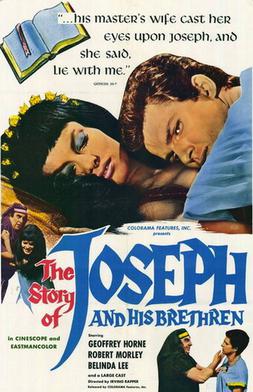
The Story of Joseph and His Brethren is a 1961 Yugoslavian/Italian film directed by Irving Rapper and Luciano Ricci.
Joseph and the Amazing Technicolor Dreamcoat is a 1999 British direct-to-video film version of the 1972 Andrew Lloyd Webber musical of the same name. It is a sung-through musical film on PolyGram Visual Programming Home Entertainment.

Biblical Egypt, or Mizraim, is a theological term used by historians and scholars to differentiate between Ancient Egypt as it is portrayed in Judeo-Christian texts and what is known about the region based on archaeological evidence. Along with Canaan, Egypt is one of the most commonly mentioned locations in the Bible, and its people, the Egyptians, play important roles in the story of the Israelites. Although interaction between Egypt and nearby Semitic-speaking peoples is attested in archaeological sources, they do not otherwise corroborate the biblical account.

José do Egito is a Brazilian miniseries produced and broadcast by RecordTV. It premiered on January 30, 2013 and ended on October 9, 2013. It is based on the biblical account of the book of Genesis that deals with the patriarch Joseph, son of Jacob.

















